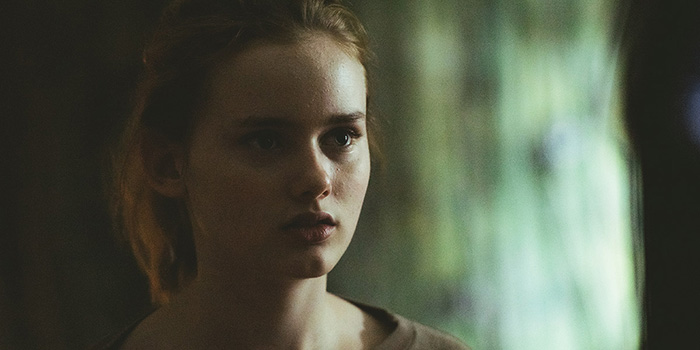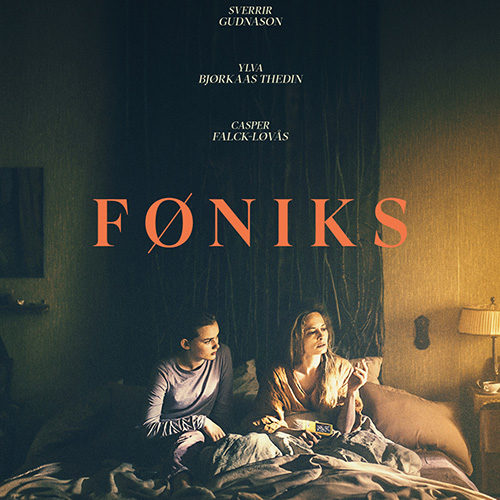If our best laid plans are said to often go awry, what happens to the ones we hastily make in desperation? Writer/director Camilla Strøm Henriksen looks to supply an answer to that very question with her feature debut Phoenix because desperation is all young Jill (Ylva Bjørkaas Thedin) has left. Her fourteenth birthday is just days away and yet she returns home from school to see the beginnings of a celebration abandoned and her mother Astrid (Maria Bonnevie) asleep in bed. Knowing her little brother (Casper Falck-Løvås’ Bo) is on his way, Jill looks to clean up the evidence and/or make excuses so as not to reveal Mom’s depression has completely turned her around from remembering the important things too. It’s seems a tragically all-too familiar act.
What’s interesting is that the truth isn’t quite what Jill believes. Whether or not it’s better or worse, however, still remains to be seen. Astrid was indeed starting festivities, but they were meant to be celebrating her own good news: a potential slam-dunk job interview. And being that it’s so rare for her mother to be in genuinely good spirits, the thought that she might have forgotten Jill’s birthday altogether must be pushed away. What Astrid needs now is support, even if that entails riding her manic spell of artistic creativity since the desire to paint again means she may actually have the energy and confidence to attend that meeting. But happiness is always short-lived with the Vogler family. Something always arrives to remind them about fate’s cruelty.
Since the slightest change can derail Astrid’s mood, Jill must be vigilant to help steer her through every downward shift. As anyone who has ever known a depressive person understands, though, assistance can become a slippery slope. The sheer fact that you must be on your toes to defuse situations and talk up small victories as monumental breakthroughs puts you on that thinnest of lines separating cheerleader from watchdog. What may bring a smile of joy to their face one instance can also transform it into a scowl of recognition — a reminder that their ailment makes it so those they love can’t trust them to follow through just as much as they can’t trust themselves. Phoenix‘s first half is heartbreaking as a result and Bonnevie’s performance absolutely devastating.
Henriksen depicts Astrid’s mental health with great empathy and Jill’s reactions with an honest uncertainty as far as what to do and how it will work out. The former’s swings from bliss to rage are swift, the horror of seeing what has become of her house mortifying beyond words. Bonnevie is so good and so much is said by portraying the chaos surrounding a thing many dismiss as “normal” that we forget her Astrid isn’t the lead. She’s actually the conflict that Jill must battle and protect. She’s the figure who needs to take the spotlight despite this weekend being about her daughter. Luckily Jill is strong enough to realize as much. But when Astrid’s focus threatens to take everything from this teenager, something breaks inside her too.

Suddenly reason and sense are thrown out the window as Jill goes into reactive overdrive in the face of tragedy. She must expand this maternal instinct she’s cultivated in the absence of true parental care off of her mother and onto Bo. She must wield it as a means to protect him as well as her own sanity in the hopes their father Nils (Sverrir Gudnason) comes to town as promised. If she can survive the crippling emotional turmoil swirling inside that’s numbed her until then, she can begin to start manipulating him into being more than his capabilities too. But just as Astrid can’t will herself to conquer her disease for more than a few hours, Nils can only escape his own selfish ego for so long.
The film’s second half is therefore all the more distressing. Now there’s a secret to hide in order to keep things moving with optimism we’re afraid to admit is misguided. Jill is forced to compartmentalize information so she can try and salvage a life that may soon be upended beyond recognition. Thedin is up to the task, constantly letting her thoughts wander from the joy of the moment to the despair eating at her soul. Her mind begins to play tricks on her as a pile of dirty, paint-filled rags manifests into a spider-monster following her around — an embodiment of her guilt and grief to remind her that the façade she’s built is paper-thin. And as Jill pushes forward, secrets she didn’t know are revealed to shatter everything.
Eventually the title no longer represents how two adults who messed up their lives (whether preventable or not) can be reborn as what their children need. Soon we understand the only character who could embrace a rebirth is Jill, but only after her world crumbles to dust. Rather than show a phoenix rising from death, Henriksen is documenting how the ashes it escapes are gradually and immovably formed. We’re watching as a young girl learns life is far from a fairy tale and that bad news is often followed by even worse. The film shows two broken people who somehow created a third able to accomplish what they couldn’t. Jill’s fierce tenacity might not ultimately be able to save her parents, but she may yet still save herself.
Phoenix screened at the Toronto International Film Festival.

